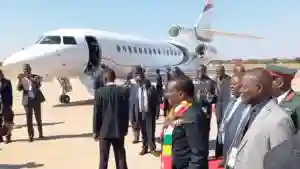Some Zimbabweans are unhappy about reports that President Emmerson Mnangagwa has purchased a US$54 million presidential jet, a Dassault Falcon 7X, while the majority of the population lives in poverty.
The aircraft was reportedly delivered in March but was not put into service until last week when Mnangagwa attended the Transform Africa Summit in Victoria Falls.
The president also used the jet to travel with King Mswati III of Eswatini to Bulawayo for the opening of the Zimbabwe International Trade Fair.
Economists, social and political commentators have criticised the government for having misguided priorities, especially at a time when the country is suffering from economic decline. Economist Gift Mugano told NewsDay that the government was failing to prioritise areas that were struggling due to the economic situation. He is quoted as saying:
My arguments are guided by the issue of priorities. One of the major priorities for us as a country should be the health sector. The US$54m used to buy the jet could boost the health sector for a whole year (because) the money can be used in our ailing hospitals and clinics.
Mugano suggested that Mnangagwa should follow the example of his Zambian counterpart, Hakainde Hichilema, who sold top-of-the-range vehicles reserved for the president to prioritize public services.
Lawyer Sharon Hofisi said the purchase of a private jet for the President raises questions about accountability and transparency. Hofisi added that the acquisition was not budgeted for, and the government has not been transparent about how the jet was paid for or who will bear the ongoing costs of operating the jet. Hofisi pointed out that the purchase of a private jet for the President during a time of social and economic difficulties in Zimbabwe raises concerns about the government’s priorities and its dedication to addressing the needs of citizens.
Former Cabinet minister Gorden Moyo, who served in the 2009-2013 Government of National Unity, expressed concerns about Mnangagwa’s unscheduled spending. Moyo criticised the acquisition during a time of poverty, unemployment, inequality, low salaries for civil servants, and poor pensions for senior citizens. He pointed out that the purchase was indicative of a crisis of leadership, moral rectitude, and a moral crisis that had eroded hope in the second republic.
Farai Maguwu, the director of the Centre for Natural Resource Governance, said while it is unclear where the money for the jet came from, the purchase was inappropriate given the country’s current state. Maguwu noted that the country’s health system and infrastructure were in disarray, and life expectancy had decreased due to a collapsed health delivery system.
Nick Mangwana, the permanent secretary of the Information Ministry, stated that he was not aware of the purchase of any plane.
Last year, officials from the Treasury expressed concern about the large expenses for chartering aircraft for Mnangagwa, who has been using private jets for his international travel. The Zimbabwean government has not disclosed how private jets are hired.
President Mnangagwa has been using Dubai-registered private jets for his foreign and domestic travels since coming to power in 2017. He claimed that his travels are financed by the United Arab Emirates government, and during a meeting with the Crown Prince of Abu Dhabi, he was promised access to planes whenever he needs to travel.
However, critics are concerned that Mnangagwa’s willingness to accept gifts from foreign governments could be linked to opaque transactions that benefit his benefactors. Some speculate that Dubai-registered jets flying into Harare could be delivering scarce US dollars to the regime and smuggling out gold. The UAE reported gold imports from Africa valued at over $16 billion in 2016, and the country ranked third globally in gold exports, with a total value of $25.4 billion or 7.8% of total world exports, according to the Financial Action Task Force (FATF).

